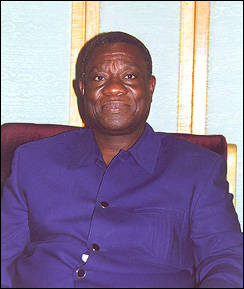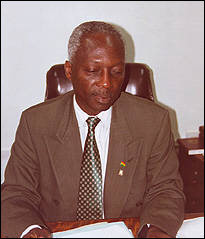 Engaging
the Private Sector Engaging
the Private Sector
Determined to push its economy forward, Ghana is combining good democratic governance with the creation of a solid foundation for all sectors of the economy by stimulating a dynamic entrepreneurial and market led business environment. The government has succeeded in providing investors with a base from which they can expand into West Africa which provides a wide and diverse market of 16 countries with a combined population of 260 million, equivalent to that of the United States.

Professor John Atta Mills , Vice-President of Ghana emphasized that "We have spent a lot of money and effort building on infrastructure, and restructuring the economy. We have succeeded in providing a congenial atmosphere for investment, and we are getting some rather good responses. People are beginning to show interest in investing in this country."
One prominent result and a shining example is the joint venture agreement struck in May between a local poultry company, the Darko Farms Company, and Tyson Foods of Arkansas, USA, which will expand the poultry industry in the West African sub-region. The specific benefits Mr. Kwabena Darko, Managing Director of Darko Farms, explains is that Tyson Foods will be able to enter the market with their experience of producing 45 million birds per week to make chicken the cheapest food in the sub-region and to expand facilities to increase production and generate more income for the company and the country. | 
Mr. Kwasi Abeasi , Director General of Private Enterprise Foundation (PEF) , an umbrella organization for various trade and industry associations, is satisfied that the government has created the environment to attract foreign capital. The Foundation together with the government has removed all the constraints and in addition all road blocks inhibiting an aggressive investment drive have been reviewed in the country’s investment code. "The investment climate has improved though, but the regulations have been changed. We have liberalized a lot of requirements for instance you do not need any foreign injection to set up a company here, if it is going to be a partnership you can start with as little as 10,000 dollars" he said.
Established to work closely with the government and to promote the investment climate, PEF has been involved jointly with the government in investment promotion missions to the U.S., France, Norway and the Far Eastern countries, where trade and investment agreements were signed.
There are a few gray areas to be polished. Mr. Abeasi acknowledged that education, human resource development and utilization as well as the legal system are hindrances the private sector is encountering. According to him, the most important is the business conflict resolution, he admits that some steps have been taken to introduce new innovations in business conflict resolution methods. "We have two arbitration centers; the American Chamber of Commerce has just established an arbitration center in addition to the National arbitration center to serve as an alternative in conflict resolution in business."
|

